An Important Proposal to Help Recover Our Economy
Hello, Folks –
I hope everyone enjoyed the glorious weekend we just had! I saw a whole lot of our neck of the woods over the last three days. Over the last three days, I had meetings in Port Orchard, Olalla, Manchester, Tacoma, Neah Bay, Port Angeles, Sequim, and Gig Harbor. By the end of the weekend, I was singing the Johnny Cash song, “I’ve Been Everywhere.”
As I write this, I’m headed back to DC for a big week. Read on for details!
Reinvesting in Our Communities
As mentioned in my last newsletter, there’s a lot of discussion about Congress moving forward on an infrastructure bill – and it looks like a bipartisan bill is taking shape. The President has proposed a framework that doesn’t just focus on roads and bridges but also things like wastewater, water systems, affordable housing infrastructure, and broadband. Those infrastructure investments can be really important for putting people to work now but also for laying the foundation for economic growth over the long haul.
As Congress discusses this jobs bill, I’m pushing for it to include a new bipartisan bill that I just introduced called the RECOMPETE Act (short for the “Rebuilding Economies and Creating Opportunities for More People Everywhere to Excel” Act – say that five times fast!). This is one of the most important bills I’ve introduced in my time in Congress – and has the opportunity to have the biggest impact.
As many of you may know, I grew up on the Olympic Peninsula and was in high school when the timber industry took it on the chin. It had a big impact on me – and I’ve spent much of my adult life trying to figure out how to make sure we are doing a better job of protecting workers and communities so that folks don’t get left behind in our economy. The economic changes – and the economic distress – we have experienced is not unique to one community. Indeed, too many communities across our region and our country are being left behind.
In looking at the challenges facing these communities, there are three problems that should shape the federal government’s response.
First, communities that are struggling often do not have the capacity to navigate the complex systems of grants and loans that exist across a multitude of federal agencies. Many cannot afford grant writers.
Second, while one-year grants are helpful, it’s worth recognizing that the struggles facing these communities didn’t arise in one year and can’t be solved in one year. A sustained approach is needed.
And third, a one-size-fits-all approach just won’t work. In our region alone, there are communities for whom the primary issue is the need for workforce, others that needs help with brownfield redevelopment. Broadband access, flooding, housing… the challenges are diverse and different in every community.
To address this, last week I introduced the bipartisan RECOMPETE Act with Senator Chris Coons and Rep. Jaime Herrera Beutler, alongside over 50 other Members of Congress. Our proposal would provide flexible, long-term grant assistance to communities that have faced persistent economic challenges. Communities could use these grants to invest in workforce, infrastructure, or other priorities to help turn things around.
I’m excited that the National League of Cities, the Washington State Association of Counties, and other organizations have endorsed this proposal as a powerful tool for economic recovery. As Rob Atkinson, the President of the Information Technology and Innovation Foundation recently said, “Over the last 40 years, federal support to help lagging regions and communities rebound has been declining. Moreover, current efforts are often too little, too late to make a real difference for communities. The RECOMPETE Act would address these shortcomings by providing flexible long-term assistance to help persistently distressed labor markets, and the workers there, get back on their feet. The United States can no longer afford to write off whole communities. The RECOMPETE Act is an important step in reversing this trend.”
I agree with him. When Congress works on a recovery package or an infrastructure package, it’s important that it doesn’t simply amplify existing inequities between communities that have enjoyed tremendous economic growth and others that have struggled. Rather, we need to make sure that people have economic opportunity – regardless of what zip code they live in. I’ll keep pushing to get this legislation included in an upcoming jobs package – so stay tuned!
Securing Federal Investments for Our Region
As a member of the House Appropriations Committee, I have the opportunity to play a meaningful role in helping decide what investments our government makes. It’s an opportunity to support investments, for our region, that will create jobs and economic opportunity, help underserved populations, fulfill unmet federal obligations, and give every person a better chance at a better life. This year, I’ve been able to make progress on that front for a number of projects. Let’s get into the details!
Building Affordable Housing & Creating Jobs in Tacoma
Our region had challenges with affordable housing and homelessness before the COVID-19 pandemic – and those challenges have only been exacerbated by it. The federal government needs to be a strong partner as we work to address those challenges. That’s why I’m thrilled that the House Appropriations Committee has advanced federal funding I’ve been advocating for to advance two important projects to increase affordable housing and create more jobs on the Hilltop in Tacoma.
First, the House Appropriations Committee advanced funding for the Tacoma Housing Authority’s Hilltop Housing and Commercial project to begin redeveloping three parcels of land. This project will bring approximately 200 units of affordable housing and approximately 20,000 sq. ft. of commercial space for predominately BIPOC-owned businesses. Additionally, the Appropriations Committee advanced funding for the Hilltop Attainable Housing and Businesses Development project, which aims to address the community’s need for a central cultural hub for the Black community and to provide a home for small businesses, community ownership, community gathering space, and attainably-priced homes.
These projects can add to the community effort to revitalize a historic Tacoma neighborhood, to provide more housing, create more jobs, and to help ensure the residential and business spaces will be attainable to community residents and BIPOC-owned businesses.
Restoring the Duckabush Estuary in Mason County
In our region, we know that the Duckabush Estuary Restoration Project is a big deal when it comes to improving a critical ecosystem that can create more viable habitat for fish and wildlife, including endangered salmon species – and when it comes to reducing severe flooding events that occur at the mouth of the Duckabush River. As part of that effort, the restoration project aims to reconnect the Duckabush River to neighboring floodplains and wetlands by modifying local roads, elevating Highway 101, and rerouting utilities.
As investments are made to reroute utilities and take other steps to make this project a success, it’s important that the federal government is a strong partner so that the costs don’t fall on local ratepayers. That’s why I’m excited to report that the House Appropriations Committee has advanced funding I’ve been advocating for to assist Mason PUD 1’s efforts to relocate the distribution power line, in coordination with the restoration project, to continue providing service to residences and businesses.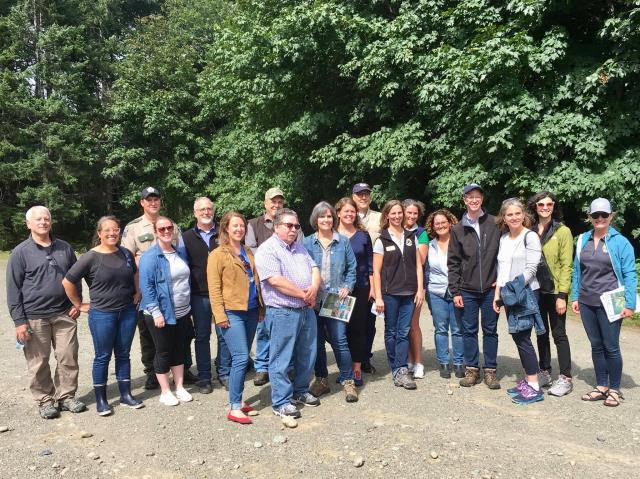
Revitalizing Downtown Bremerton
I was also excited that the appropriations bills included new funding to support the City of Bremerton’s Quincy Square Project – which aims to revitalize a downtown street – with investments in affordable housing and a day-to-night urban center with focused arts, entertainment, and evening-centric retail spaces.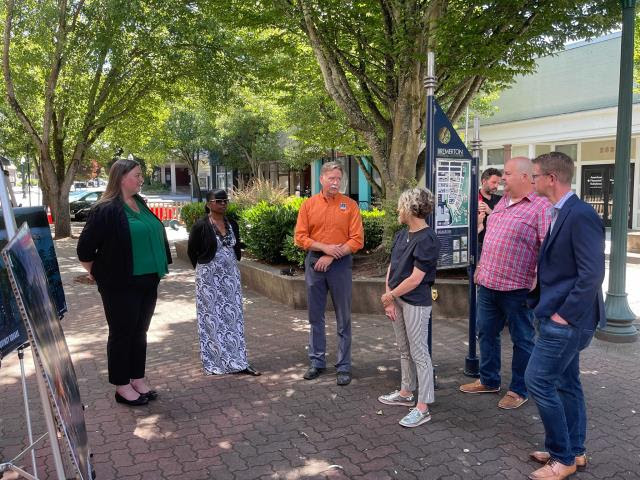
This new funding will assist the construction phase of Quincy Square—providing critical support to help complete street reconstruction, landscape and stormwater improvements, water improvements and relocations, and lighting and pedestrian improvements, among other things. This new investment will leverage public investment to honor the great Quincy Jones and help build long-term vitality in Bremerton’s downtown business core.
Investing in STEM Education on the Peninsula
When students study Science, Technology, Engineering and Math (STEM), they aren't just learning vital skills; they are receiving the foundation that can lead to a future job. With these skills they can engineer a new airplane or boat, develop new energy technologies to combat the climate crisis, or invent new technologies that will drive the country forward.
I’m thrilled that the House Appropriations Committee advanced new federal funding I advocated for in order to support the West Sound STEM Network’s “Empowering the Peninsula” project. The project aims to increase geographic equity in STEM programming on the Olympic Peninsula, develop K-12 and higher education partnerships with representation from underserved populations, and expand outreach on the Peninsula. The funding will help West Sound STEM move forward with hiring new staff, establishing an Olympic Peninsula office, and provide funding for workshops, convenings, and industry familiarization events for underserved populations.
I’ll keep working to advance STEM education for students in Kitsap County and across the Olympic Peninsula so we can further support youth education in these crucial fields—which can help lead to more job opportunities for them in the future, more qualified employees for local employers, and more economic resiliency for our communities.
Assisting Tribal Relocation Efforts on Our Coasts
Climate change, rising sea levels, and the increased risk of tsunami are threatening coastal communities across our region – including the homelands of the Quileute Tribe, the Hoh Tribe, and the Quinault Indian Nation.
The federal government has an obligation to fulfill its trust and treaty responsibilities and to make sure that people aren’t put at risk. That’s why I’m proud that the Appropriations Committee advanced funding for three projects that will help ensure these tribal communities get the support they need to build out infrastructure as they seek to move to higher ground and keep their people out of harm’s way.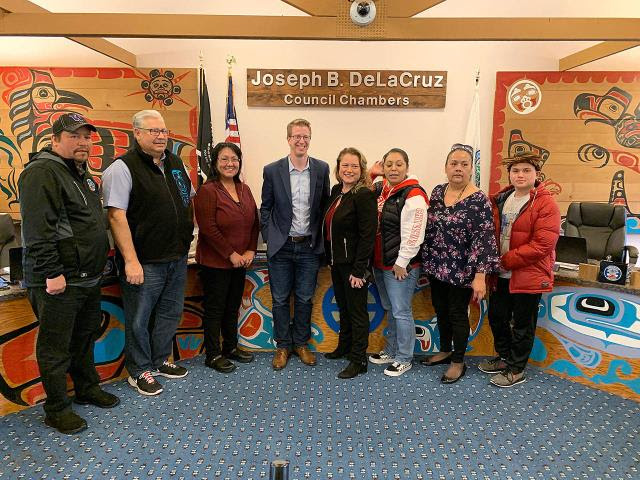
It’s a big deal that funding for these projects has cleared this important hurdle – and I’ll keep pushing to see the federal government meet its trust and treaty responsibilities so we can keep people safe.
Working for You
Pushing for Voting Rights
On the anniversary of the passing of my late colleague, John Lewis, I attended an inspiring vigil in Gig Harbor to commemorate his leadership and to continue pushing for voting rights. Thank you to all who attended!.jpg)
Supporting Our Community Institutions
I enjoyed the opportunity to catch-up with Kitsap Regional Library Director Jill Jean & South Kitsap Regional Manager Kathleen Wilson. The pandemic has been tough for libraries, but the Kitsap Regional Library system has gone above and beyond to meet the needs of the community! I’m grateful for all they do!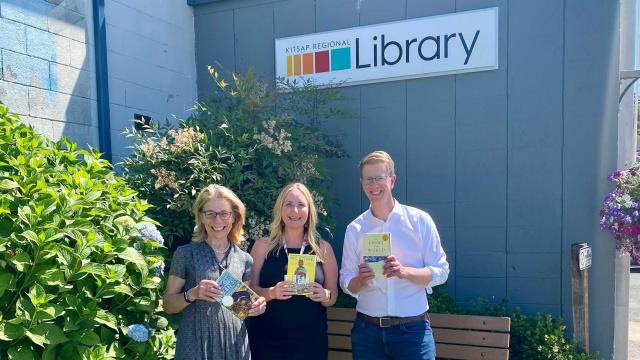
Celebrating Allyn Days
Sophie and I had a fantastic time at Allyn Days!!! It was so terrific visiting with folks. It was tough to decide what was the biggest treat: serving meals (I was on tartar sauce duty), joining the fry bread crew, or meeting a giant salmon!
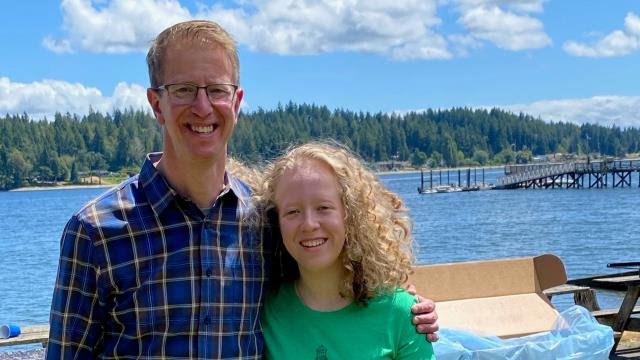
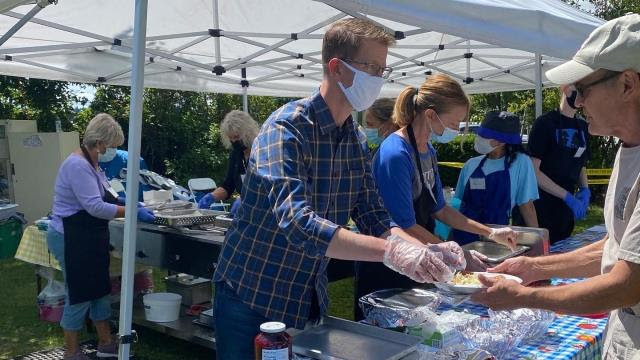
OK – that’s it for now folks. As always, I’m honored to represent you.
Sincerely,
Derek Kilmer
